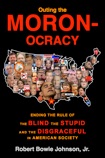Outing the
MORONOCRACY
ENDING THE RULE OF THE BLIND, THE STUPID, AND
THE DISGRACEFUL IN AMERICAN SOCIETY

Outing the
MORONOCRACY
ENDING THE RULE OF THE BLIND, THE STUPID, AND
THE DISGRACEFUL IN AMERICAN SOCIETY


Excerpts from
APPENDIX I: THE VANITY OF REASONING
By A. E. Knoch
Co-founder of the Concordant Publishing Concern
From Unsearchable Riches magazine, September, 1934
Due to the discordant renderings of the English Authorized Version (King James], my heart was not impressed with the futility and vanity of human reasoning, although the evidence had been before me for at least thirty years. I greatly admired the close, consistent ratiocination of the Scriptures, and could not help comparing this with the reasonings of men, especially the saints [members of the body of Christ]. Their manner of making deductions from the Word of God awoke to me the fact that it was all futile. Not till then did I investigate the subject itself in the Scriptures, and I was astonished and delighted to find that my experience was in perfect accord with the written record. Since then I have been on the alert to see if reasoning is ever necessary or profitable in the study of the Word, and to find a remedy to counteract its plague.
The remedy is exceedingly simple: it is faith. If we believe all of God’s Word we will not need to reason. The Scriptures do not consist of a collection of premises, which we must combine in order to get the truth. When reasoning is necessary, it is done for us. I well remember, in my early youth, reading a statement to the effect that man’s highest mental effort is to extract from the Bible a system of theology, to take the scattered fragments of truth which it contains, and build them together into the edifice misnamed the science of God. Man is so irrational that the grotesqueness of these systems, their irreconcilable differences, and the un-Godlike spirit they engender have not discouraged him in his pathetic efforts. Reasoning from the Bible has done unutterably more to discredit God’s revelation than all the infidels.
This conclusion is one of the most satisfactory helps in deciding between two antagonistic teachings. In examining any doctrine I wish to know first of all, Is it faith, or is it inference? Is this this, or is this that? Do the Scriptures directly teach this or is it supposed to follow from their teaching? Then if it is reasoning, the next question is, Do the Scriptures teach this directly, or do they deny it? So far there have been very few deductions that have not also been direct denials of plain statements in other parts of the Scriptures.
We will now consider those passages in Holy Writ in which the words reason or reasoning occur, in order to discover, if we can, what God’s attitude toward it is. The Authorized Version renders the Greek verb dialogizomai [reason] as: cast in mind, consider, dispute, muse, reason, and think. Dialogismos, the noun, is translated disputing, doubtful, doubting, imagination, reasoning, and thought. It is evident that anyone who relies on that version will live in a fog, so far as this theme is concerned. Perhaps the most unfortunate of all is found in Romans 14:1, “Him that is weak in the faith receive ye, but not to doubtful disputations.” It should read, as it does in the Concordant Version “discrimination of reasonings.” Are not most divisions among the Lord’s people based upon this very thing? Had they known and heeded the warning here given, that reasoning from the Scriptures is never to be a basis of fellowship, how much heartache would have been hindered!
We will quote all of the passages in which reason is spoken of in the Greek Scriptures as rendered in the Concordant Version, and print them in smaller type to distinguish them from our comments. In general, it will be seen that it is always opposed to faith. In the disciples, it not only reveals their lack of confidence in Christ, but feeds their pride. When the people reasoned, they mistook John the Baptist for the Messiah. The scribes and Pharisees are the chief reasoners. If reason were normal in man, nothing would have been easier than for them to deduce from the Scriptures that Jesus is the Messiah. But reason is seldom according to truth. It is almost always allied with error. It was their chief weapon against Him Who is the Truth.
THE REASONING OF THE DISCIPLES
Now they reasoned among themselves, saying that “We got no bread.” Now, knowing it, Jesus said, “Why are you reasoning among yourselves, scant of faith, that you have no bread?” (Matthew 16:7-8).
And they reasoned with one another, saying that “We have no bread!” And, knowing it, Jesus is saying to them, “Why are you reasoning that you have no bread. Are you not yet apprehending, neither understanding?” (Mark 8:16-17).
The disciples had forgotten to get bread. One of the premises of their syllogism was an empty stomach, often a powerful factor in human ratiocination. How simple was their logic! An empty stomach. No bread. Hunger. Who can find a flaw in that? But they might far more justly have considered that He Who had fed five thousand with five cakes and two fishes, and had twelve panniers over, needed less than nothing in order to feed them. That, of course, would not have been reasoning, for it depended on a Factor Who was still misunderstood by them. They manifested their unbelief. So He purposely said, “See and take heed of the leaven of the Pharisees and Sadducees!” What was this leaven? Had they any of it? They had. They exhibited both hypocrisy and unbelief as soon as He warned them against these evils.
WHO IS THE GREATEST APOSTLE?
And they came into Capernaum, and, being come into the house, He inquired of them, “What did you reason with yourselves on the road?” Yet they were silent, for they argued with one another on the road as to who is greater. And, being seated, He summons the twelve and is saying to them, “If anyone wants to be first, he will be last of all, and servant of all.” And taking a little child, He stands it in their midst, and clasping it in His arms, said to them, “Whoever should be receiving one of such little children in My name, is receiving Me: and whoever should be receiving Me, is not receiving Me, but Him Who commissions Me” (Mark 9:33-37).
Now a reasoning entered among them, which of them should be greater. Now Jesus, perceiving the reasoning of their hearts, getting hold of a little child, stands it beside Himself, and said to them, “Whoever should be receiving this little child in My name, is receiving Me, and whoever should be receiving Me is receiving Him Who commissioned Me, for he who possesses more of littleness among you all, he is great” (Luke 9:46-48).
Who was the greatest apostle? If they had only known of Paul! Less than the least of all saints, not fit to be called an apostle, such was his title to greatness. None of them measured up to this. I am sure, however, that they would not have considered him even eligible. They had just failed to cure the boy with the unclean spirit. Peter and John and James would have a good argument in the fact that they were not there, but had been chosen to accompany their Master up the holy mount. Moreover, the Lord had solemnly charged their hearts to heed His humiliation. At such a time, when He is about to descend into the depths, they reason (I almost hate the word!), and each one selfishly seeks to scramble to the top! How unreasonable is such reasoning!
THE CHIEF PRIESTS AND ELDERS
And at His coming into the sanctuary, the chief priests and the elders of the people came to Him, while teaching, saying, “By what authority are you doing these things, and who gives you this authority?”
Now, answering, Jesus said to them, “I also shall be asking you one word, which should you be telling me, I also shall be declaring to you by what authority I am doing these things. The baptism of John—whence was it? Of heaven or of men?”
Now they reasoned with themselves, saying, “Should we be saying, ‘Of heaven,’ He will be declaring to us, ‘Wherefore, then, do you not believe him?’ Yet if we should be saying, ‘Of men,’ we are fearing the throng, for all are having John as a prophet.” And answering Jesus, they said, “We are not aware” (Matthew 21:23-27).
Here we have the flower of Israel, those best equipped for logical deduction, at the most acute crisis in their career. Their business was to believe the sacred oracles entrusted to them. Had they done this they would never had recourse to reason. Christ had cured the blind and the lame in the sanctuary, before their very eyes. Not only that, but, when the boys cried out “Hosanna to the Son of David,” He had pointed out to them that David himself had foretold this in the sacred writings of which they were the custodians (Psalms 89:2). But—and here was the rub—our Lord had also cast out all those buying and selling in the sanctuary, and the brokers’ tables, and the dove sellers’ seats. Few premises in an argument are as potent as a pocket book. He was interfering with their revenue, and actually found his authority for doing so in the Scriptures. He recognized the high station of these officials, and quoted to them the passages upon which He proceeded.
After having given them God’s own words as authority for His acts, they come and ask, “By what authority . . . who gives you this authority?” As much to say, God’s Word has no authority. We are responsible for this sanctuary. You have not consulted us! We do just as we wish around here, and do not recognize anyone else. So our Lord asked them a question in order to show them how little authority they exercised, and to bring home to them the fact that they were puppets of the people instead of representatives of the God Whose holy Name they fearfully defame. The question was a simple, but searching one. If they had hearkened to John the Baptist, as they, of all men, should have done, then they would also have welcomed Him Whose forerunner he was. That is where their unbelief began. Now they had another opportunity.
Real reasoning would have made short work of it. John’s credentials were in accord with the ancient prophets. But human reason is affected far more by the conclusion than by the premises, strange as that may seem. They were caught in the horns of a dilemma. And their vaunted reason could do nothing better than give them a most uncomfortable and humiliating position on the fence. “We are not aware!” They did not love Him any more for driving them into this distressing confession. It was a triumph of reason! . . .